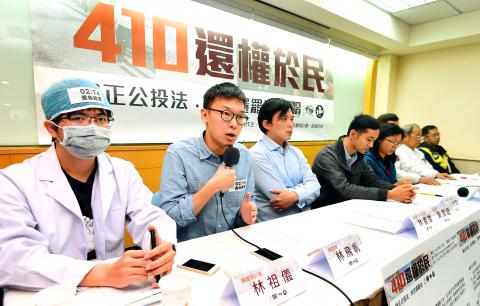Leaders of last year’s Sunflower movement yesterday called on the public to support their demands for direct democracy by taking part in a large rally scheduled for April 10.
The date marks the one-year anniversary of the Sunflower movement’s retreat — when student-led protesters made their exit from the Legislative Yuan’s main chamber, after occupying the building for nearly 23 days in protest against the government’s handling of a proposed cross-strait service trade agreement.
Organizers of the rally — called Power to the People — said the event would highlight their demands to reform the nation’s laws on referendums and recall procedures, which they see as two keystones in ensuring that members of the public have a say in politics.

Photo: Lo Pei-der, Taipei Times
They emphasized the importance of direct, participatory policymaking as a way to “correct problems inherent in representative politics,” adding that events leading up to the Sunflower movement clearly illustrated the failure of legislators to represent the will of the people.
Sunflower movement co-leader and Taiwan March convener Lin Fei-fan (林飛帆) told a news conference in Taipei that the rally would be a continuation of the ideals expressed during the Sunflower movement.
“Following our retreat last year, many people questioned whether it was the end of the Sunflower movement. However, over the past year, we have seen the hard work and effort put into demands for direct democracy,” Lin said.
Critics of the Referendum Act (公民投票法) have long argued that the act’s turnout threshold of 50 percent for a referendum to be declared valid is largely unattainable.
The petition threshold for recall referendums — which requires the signatures of 13 percent of eligible voters in a given constituency within 30 days — has also been described as “ridiculously high” in comparison with most other countries.
Appendectomy Project spokesperson Mr Lin From Taipei (台北林先生) said that the public should be able to exercise their constitutional rights in recalling inept politicians, adding that recall efforts should be considered to be just as important as elections.
“Although the right to recall politicians was written into our constitution more than 70 years ago, we have never successfully recalled any government official,” Lin said.
On March 18, the organizers are set to hold a smaller parade around the Legislative Yuan compound, coinciding with the day when protesters first swarmed the legislature’s main chamber last year.

Taipei has once again made it to the top 100 in Oxford Economics’ Global Cities Index 2025 report, moving up five places from last year to 60. The annual index, which was published last month, evaluated 1,000 of the most populated metropolises based on five indices — economics, human capital, quality of life, environment and governance. New York maintained its top spot this year, placing first in the economics index thanks to the strength of its vibrant financial industry and economic stability. Taipei ranked 263rd in economics, 44th in human capital, 15th in quality of life, 284th for environment and 75th in governance,

Greenpeace yesterday said that it is to appeal a decision last month by the Taipei High Administrative Court to dismiss its 2021 lawsuit against the Ministry of Economic Affairs over “loose” regulations governing major corporate electricity consumers. The climate-related lawsuit — the first of its kind in Taiwan — sought to require the government to enforce higher green energy thresholds on major corporations to reduce emissions in light of climate change and an uptick in extreme weather. The suit, filed by Greenpeace East Asia, the Environmental Jurists Association and four individual plaintiffs, was dismissed on May 8 following four years of litigation. The

A former officer in China’s People’s Liberation Army (PLA) who witnessed the aftermath of the 1989 Tiananmen Square massacre has warned that Taiwan could face a similar fate if China attempts to unify the country by force. Li Xiaoming (李曉明), who was deployed to Beijing as a junior officer during the crackdown, said Taiwanese people should study the massacre carefully, because it offers a glimpse of what Beijing is willing to do to suppress dissent. “What happened in Tiananmen Square could happen in Taiwan too,” Li told CNA in a May 22 interview, ahead of the massacre’s 36th anniversary. “If Taiwanese students or

The New Taipei City Government would assist relatives of those killed or injured in last month’s car-ramming incident in Sansia District (三峽) to secure compensation, Mayor Hou You-yi (侯友宜) said yesterday, two days after the driver died in a hospital. “The city government will do its best to help the relatives of the car crash incident seek compensation,” Hou said. The mayor also said that the city’s Legal Affairs, Education and Social Welfare departments have established a joint mechanism to “provide coordinated assistance” to victims and their families. Three people were killed and 12 injured when a car plowed into schoolchildren and their